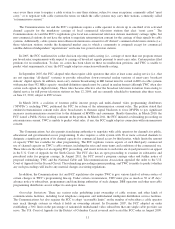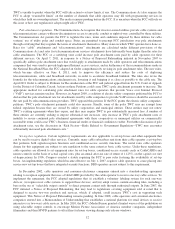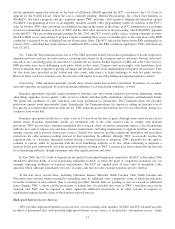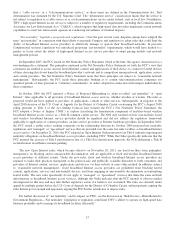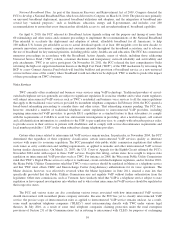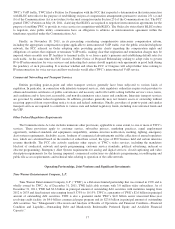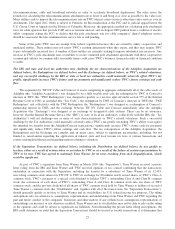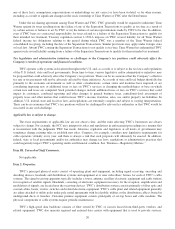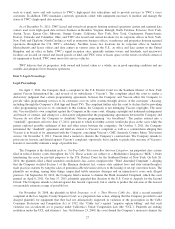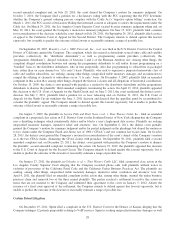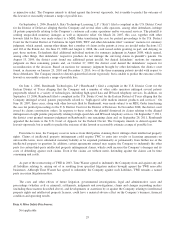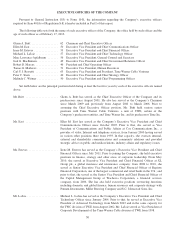Time Warner Cable 2011 Annual Report Download - page 29
Download and view the complete annual report
Please find page 29 of the 2011 Time Warner Cable annual report below. You can navigate through the pages in the report by either clicking on the pages listed below, or by using the keyword search tool below to find specific information within the annual report.Risks Related to TWC’s Operations
A prolonged economic downturn, especially a continued downturn in the housing market, may negatively impact TWC’s
ability to attract new subscribers and generate increased revenues.
The U.S. economy has experienced a protracted slowdown, and the future economic environment may continue to be
challenging. A continuation or further weakening of these economic conditions could lead to further reductions in consumer
demand for the Company’s services, especially premium services and DVRs, and a continued increase in the number of
homes that replace their wireline telephone service with wireless service or “over-the-top” phone service and their video
service with Internet-delivered and/or over-air content, which would negatively impact TWC’s ability to attract customers,
increase rates and maintain or increase revenues. In addition, providing video services is an established and highly penetrated
business. TWC’s ability to gain new video subscribers is dependent to a large extent on growth in occupied housing in
TWC’s service areas, which is influenced by both national and local economic conditions. If the number of occupied homes
in TWC’s operating areas continues to decline and/or the number of home foreclosures significantly increases, it may
negatively impact TWC’s ability to gain new video subscribers.
TWC’s business is characterized by rapid technological change, and if TWC does not respond appropriately to
technological changes, its competitive position may be harmed.
TWC operates in a highly competitive, consumer-driven and rapidly changing environment and its success is, to a large
extent, dependent on its ability to acquire, develop, adopt and exploit new and existing technologies to distinguish its services
from those of its competitors. If TWC chooses technologies or equipment that are less effective, cost-efficient or attractive to
its customers than those chosen by its competitors, or if TWC offers services that fail to appeal to consumers, are not
available at competitive prices or that do not function as expected, TWC’s competitive position could deteriorate, and TWC’s
business and financial results could suffer.
The ability of TWC’s competitors to acquire or develop and introduce new technologies, products and services more
quickly than TWC may adversely affect TWC’s competitive position. Furthermore, advances in technology, decreases in the
cost of existing technologies or changes in competitors’ product and service offerings also may require TWC in the future to
make additional research and development expenditures or to offer at no additional charge or at a lower price certain
products and services TWC currently offers to customers separately or at a premium. In addition, the uncertainty of the costs
for obtaining intellectual property rights from third parties could impact TWC’s ability to respond to technological advances
in a timely manner.
Regulation may limit TWC’s ability to make required investments or adopt business models that are needed to continue to
provide robust high-speed data service.
The rising popularity of bandwidth-intensive Internet-based services increases the demand for and usage of TWC’s
high-speed data service. Examples of such services include the delivery of video via streaming technology and by download,
peer-to-peer file sharing services and gaming services. TWC will need flexibility to develop pricing and business models that
will allow it to respond to such changing consumer uses and demands and, if necessary, to invest more capital than currently
expected to increase the bandwidth capacity of its systems. TWC’s ability to do these things could be restricted by legislative
or regulatory efforts to impose so-called “net neutrality” requirements on cable operators. See “—Risks Related to
Government Regulation—‘Net neutrality’ legislation or regulation could limit TWC’s ability to operate its high-speed data
business profitably and to manage its broadband facilities efficiently.”
TWC relies on network and information systems and other technology, and a disruption or failure of such networks,
systems or technology as a result of computer viruses, “cyber attacks,” misappropriation of data or other malfeasance, as
well as outages, natural disasters, accidental releases of information or similar events, may disrupt TWC’s business.
Because network and information systems and other technologies are critical to TWC’s operating activities, network or
information system, shutdowns caused by events such as computer hacking, dissemination of computer viruses, worms and
other destructive or disruptive software, “cyber attacks” and other malicious activity pose increasing risks. TWC’s network
and information systems are also vulnerable to damage or interruption from power outages, natural disasters, terrorist attacks
and similar events. Any of these events could have an adverse impact on TWC and its customers, including degradation of
service, service disruption, excessive call volume to call centers and damage to TWC’s plant, equipment, data and reputation.
21


